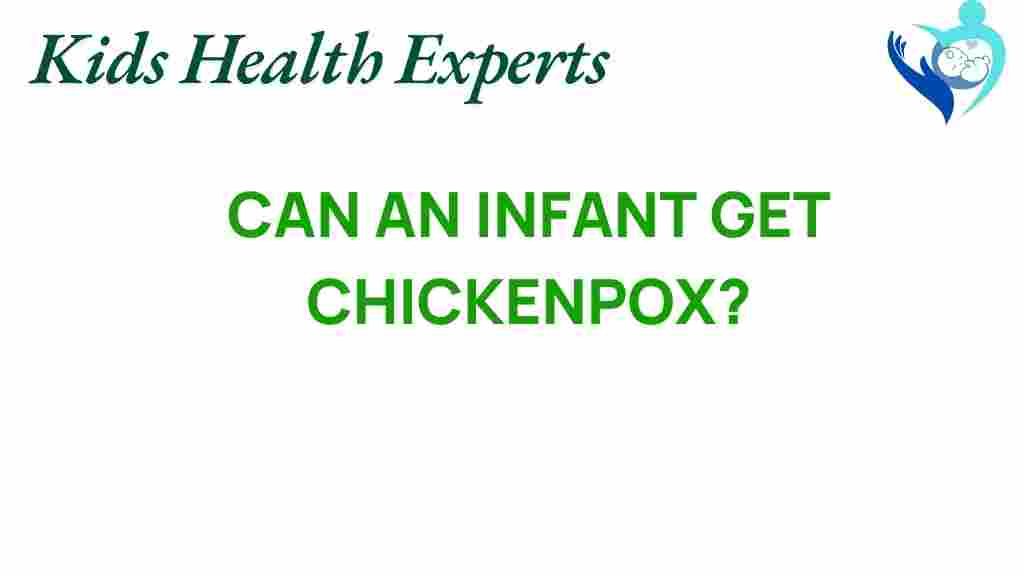Can an Infant Get Chickenpox? Understanding the Risks and Facts
Chickenpox is a highly contagious viral infection caused by the varicella-zoster virus. While it is commonly associated with children, many parents wonder if infants can also contract chickenpox. This article aims to unravel the myths and facts surrounding chickenpox in infants, discussing symptoms, contagiousness, vaccination, health implications, and prevention strategies. Understanding these elements is crucial for effective pediatric care and maintaining the health of your child.
What is Chickenpox?
Chickenpox, or varicella, is characterized by an itchy rash, red spots, and flu-like symptoms. It primarily affects children and is known for its ability to spread rapidly among individuals who have not been vaccinated or previously infected. The varicella-zoster virus is highly contagious, making it vital for parents to understand the risks associated with chickenpox, especially concerning their infants.
Can Infants Get Chickenpox?
Yes, infants can get chickenpox. While they are generally protected from the virus due to maternal antibodies, this immunity diminishes over time. If an infant is exposed to the virus and does not have adequate maternal antibodies, they can contract chickenpox. Here are some key points to consider:
- Age Factors: Infants younger than 12 months are at a higher risk of developing chickenpox if exposed.
- Maternal Immunity: If the mother has had chickenpox or the varicella vaccine, she can pass antibodies to her infant, providing temporary protection.
- Exposure Risk: Infants who are in close contact with older siblings or caregivers who have chickenpox are more susceptible.
Symptoms of Chickenpox in Infants
The symptoms of chickenpox typically appear 10 to 21 days after exposure to the virus. Recognizing these symptoms early can help in managing the condition effectively. Common signs include:
- Itchy Rash: A red, itchy rash that starts as small red bumps and progresses to fluid-filled blisters.
- Fever: Mild to moderate fever often accompanies the onset of the rash.
- Fatigue: Infants may appear more tired and irritable than usual.
- Loss of Appetite: A decrease in appetite can occur during the initial stages.
- Headache and Body Aches: General discomfort is common.
Contagiousness of Chickenpox
Chickenpox is highly contagious, making it important for parents to understand how the virus spreads:
- Direct Contact: The virus can spread through direct contact with the rash of an infected person.
- Respiratory Droplets: Chickenpox can also spread through respiratory droplets when an infected person coughs or sneezes.
- Contagious Period: An infected person is contagious from about 1-2 days before the rash appears until all blisters have crusted over.
Vaccination: The Best Prevention Against Chickenpox
The most effective way to prevent chickenpox is through vaccination. The varicella vaccine is recommended for children, usually given in two doses:
- First Dose: Administered between 12 and 15 months of age.
- Second Dose: Administered between 4 and 6 years of age.
Vaccination not only protects your child but also helps in preventing the spread of the virus in the community. Here are some important points about vaccination:
- Effectiveness: The varicella vaccine is about 90% effective at preventing chickenpox.
- Herd Immunity: Widespread vaccination contributes to herd immunity, protecting those who cannot be vaccinated, such as infants under 12 months.
- Side Effects: Mild side effects may include a rash or fever, but severe complications are rare.
Health Implications for Infants with Chickenpox
Chickenpox in infants can lead to more severe health complications compared to older children. These complications may include:
- Dehydration: High fever and rash can lead to dehydration, which is particularly concerning for infants.
- Skin Infections: Scratching the itchy rash can cause bacterial infections.
- Pneumonia: Chickenpox can lead to pneumonia, especially in very young infants.
- Cerebellar Ataxia: Rarely, chickenpox can cause neurological complications.
If you suspect your infant has chickenpox, it’s essential to consult your pediatrician for appropriate care and guidance.
Pediatric Care: Managing Chickenpox in Infants
Managing chickenpox in infants requires careful attention to their symptoms and needs. Here are some tips for providing effective pediatric care:
- Monitor Symptoms: Keep track of fever and the progression of the rash.
- Hydration: Ensure your infant stays well-hydrated, especially if they have a fever.
- Itch Relief: Use gentle moisturizers and anti-itch lotions to soothe the rash. Avoid scratching to prevent infections.
- Comfort Measures: Keep your infant comfortable with light clothing and a cool environment.
Troubleshooting: When to Seek Medical Attention
While chickenpox is usually mild in healthy children, there are situations where you should seek medical attention:
- If your infant is very young (under 12 months) and shows symptoms of chickenpox.
- If the fever lasts more than four days or is very high (above 102°F).
- If the rash appears infected, showing signs of increased redness, warmth, or pus.
- If your infant experiences difficulty breathing or shows signs of dehydration.
Prevention Strategies for Chickenpox
In addition to vaccination, you can take several preventive measures to protect your infant from chickenpox:
- Avoiding Exposure: Keep your infant away from individuals known to have chickenpox or shingles.
- Hygiene Practices: Encourage good hygiene, including frequent hand washing.
- Educate Caregivers: Ensure that anyone caring for your infant is vaccinated or has had chickenpox to minimize risk.
Conclusion
Understanding the risks of chickenpox in infants is crucial for every parent. While infants can contract chickenpox, vaccination plays a significant role in prevention and protection. By recognizing the symptoms, knowing how the virus spreads, and seeking appropriate pediatric care, you can help safeguard your infant’s health. Always consult your healthcare provider for personalized advice and strategies tailored to your child’s needs. For more information on vaccination schedules, you can visit the CDC website.
By staying informed and proactive, you can ensure that your infant remains healthy and safe from chickenpox and its potential complications.
This article is in the category Conditions and created by KidsHealthExperts Team

2 thoughts on “Can an Infant Get Chickenpox? Unraveling the Myths and Facts”